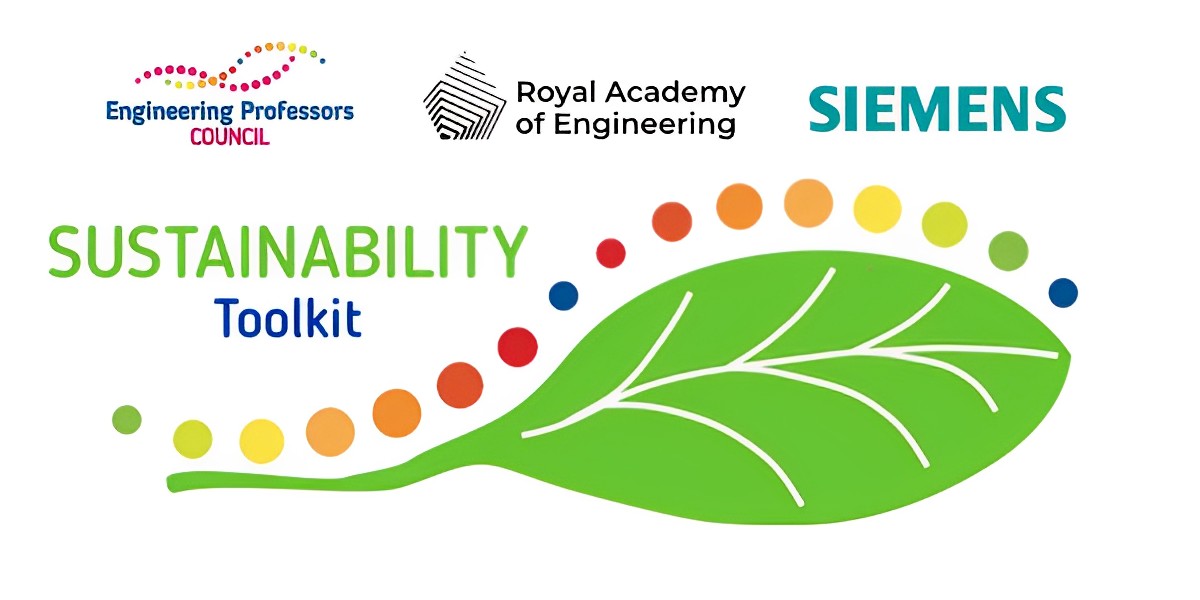Author: Professor Manuela Rosa (Algarve University, Institute of Engineering).
Topic: Engineering for ecological sustainability.
Tool type: Knowledge.
Relevant disciplines: Any.
Keywords: Curriculum; Engineering professionals; Ecology; Ecosystem services; Natural resources; Interdisciplinary; Biodiversity; Water and sanitation; Climate change; AHEP; Sustainability; Higher education; Pedagogy.
AHEP mapping: This resource addresses two of the themes from the UK’s Accreditation of Higher Education Programmes fourth edition (AHEP4): The Engineer and Society (acknowledging that engineering activity can have a significant societal impact) and Engineering Practice (the practical application of engineering concepts, tools and professional skills). To map this resource to AHEP outcomes specific to a programme under these themes, access AHEP 4 here and navigate to pages 30-31 and 35-37.
Related SDGs: SDG 4 (Quality education); SDG 6 (Clean water and sanitation); SDG 7 (Affordable and clean energy); SDG 12 (Responsible consumption and production); SDG 14 (Life below water).
Who is this article for? This article should be read by educators at all levels in higher education who wish to embed environmental and ecological sustainability into the engineering curriculum or design modules. Engaging with this topic will also help to prepare students with the soft skill sets that employers are looking for.
Premise:
Engineering has always responded to the societal challenges of humanity, contributing to its progress and economic development. However, the synergetic effects of fossil-based economic growth together with large-scale engineering projects have also caused great pressures on natural resources and ecosystems leading to over-exploitation and degradation. In consequence, in the last decades, a multidimensional perspective on sustainability perspective has arisen, and has been acknowledged by social movements, governments and institutions.
Meanwhile, this assumes deep epistemological changes, requiring holistic and transdisciplinary approaches that must be considered by engineering professionals, establishing communication based on new ways of thinking. There is the need to interweave disciplines, to establish complementary relationships, to create associations in order to root new knowledge, enabling communication between the sciences. In doing so, transdisciplinary science has emerged, i.e. the science that can develop from these communications. It corresponds to a higher stage succeeding the stage of interdisciplinary relationships, which would not only cover interactions or reciprocities between specialised research projects, but would place these relationships within a total system without any firm boundaries between disciplines (Piaget, 1972).
Currently, the complexity associated with climate change and the uncertainty of the link between global loss of biodiversity and current loss of public health, are demanding innovative knowledge, needing those holistic and transdisciplinary approaches. Engineering professionals must therefore give additional attention to ecological sustainability.
The challenges of sustainability:
The term “sustainability” portrays the quality of maintenance of something which can continue for an indefinite time, such as biological species and ecosystems. Sustainability is based on a dynamic balance between natural and human ecosystems, in order to maintain the diversity, complexity and functions of the ecological systems that support life, while contributing to prosperous and harmonious human development (Costanza, 1997). This strong perspective of sustainability needs to have a prominent place in land use management which must consider the carrying capacity of natural ecosystems.
Ecological sustainability in particular aims to maintain the earth’s natural potential and the biosphere, its stock of natural resources, atmosphere and hydrosphere, ecosystems and species. Ecosystems should be kept healthy by preserving their “ecological integrity”, i.e. the capacity to maintain the structure and function of its natural communities, which includes biogeochemical cycles.
Engineering professionals must therefore understand the global limits for water, land, and energy use (contributing to less atmospheric carbon emissions), and preserve other natural resources, such as nutrients or biodiversity. In the technical decision-making process, they need to understand the ecological impacts of big scale projects, such as transportation infrastructures, dams, deforestation, and others. Alongside other professionals, they need to contribute to the restoration, conservation and preservation of ecosystem services, e. g. support services, production services, regulating services and cultural services. These services result in benefits that people and organisations receive from ecosystems and constitute determinants of well-being (Millennium Ecosystem Assessment, 2005).
Until now, technical solutions often focused on highly visible man-made structures, many of which stopped or disrupted natural processes. Presently, the importance of regulating natural ecosystem services such as water purification, water supply, erosion and flood control, carbon storage and climate regulation is beginning to be perceived. These are considered as soft engineering tools and must be highlighted by engineering educators and assumed in the practice.
This ecological mindset would enable solutions that recognise management and restoration of natural ecosystems in order to curb climate change, protect biodiversity, sustain livelihoods and manage rainstorms. Nature-based solutions are a natural climate solution in cities, contributing to the mitigation and adaptation of climate change through green roofs, rain gardens, constructed wetlands that can minimise damaging runoff by absorbing stormwater, reducing flood risks and safeguarding freshwater ecosystems. They are essential in climate refuges for city residents during heatwaves and other extreme climate events. These solutions need specific and new knowledge made by ecologists working with engineers and others, which demands action beyond disciplinary silo, i.e., a transdisciplinary approach.
Within this context, engineering professionals must consider specific operating principles of sustainability:
- Preserve and improve the natural resource base (e.g. biodiversity) and the stability of landscapes.
- Minimise the use of non-renewable natural resources.
- Exploit renewable resources in a manner such that: harvesting rates do not exceed regeneration rates, and pollution does not exceed the renewable assimilative capacity of the local environment (Daly, 1990) in the present and future.
- Protect the atmosphere on a regional and global scale.
- Develop building and transport decarbonisation.
- Regenerate soil and water resources.
- Apply the land-water-food-energy nexus.
- Maintain and improve historical and cultural resources and landscapes.
- Engage community and citizen participation in co-action and management processes.
- Promote ecological awareness, education and training.
- Act with ethics.
These principles must be considered in engineering education, and require deep changes in teaching, because there is a great difficulty in studying and managing the socio-ecological system according to the Cartesian paradigm which breaks up and separates the parts of a whole. New ecological thinking emphasises holistic approaches, non-linearity, and values focused on preservation, conservation and collaboration (Capra, 1996). The transdisciplinary approach needs dialogic and recursive thinking, which articulates from the whole to the parts and from the parts to the whole, and can only be unchained with the connection of the different fields of knowledge, including knowledge from local communities in specific territories.
In higher education, engineering students should establish face-to-face contacts with ecology students in order to better understand ecological sustainability and generate empathy on the subject. Engineering students must develop skills of collaboration and inter-cultural communication tools (Caeiro-Rodríguez et al., 2021) that will facilitate face to face workshops with other professionals and enrich learning experiences.
In the 21st century, beyond the use of technical knowledge to solve problems, engineering professionals need communicational abilities to consider ecological sustainability, requiring networking, cooperating in teams, and working with local communities. Engineering educators must include trans-sectoral and transdisciplinary research and holistic approaches which make clear progress in tackling ecological sustainability.
Conclusion:
The interconnected socio-ecological system must be managed for sustainability by multiple stakeholders. Engineering professionals need to develop a set of skills and competencies related with the ability to work with other ones (e.g. from the natural sciences) and citizens. Currently, beyond the use of technical knowledge to solve problems, engineers need to consider the sustainable development goals, requiring networking, cooperating in teams, and working with communities through transdisciplinary approaches.
Education for Sustainable Development is required to empower engineering professionals to adopt strong sustainable actions that simultaneously ensure ecological integrity, economic viability and a just society for the current and future generations. Education is a fundamental tool for achieving the Sustainable Development Goals, as recognised in the 2030 Education Agenda, coordinated by UNESCO (2020).
References:
- Capra, F. (1996). The Web of Life: A new scientific understanding of living systems. New York Anchor Books.
- Millennium Ecosystem Assessment (2005) Ecosystems and Human Well-Being: Synthesis. Island Press, Washington, DC.
- Piaget, J. (1972) ‘The Epistemology of Interdisciplinary Relationships.’ in Apostel, L. et al. (eds.): Interdisciplinarity: Problems of Teaching and Research in Universities. (Centre for Educational Research and Innovation (CERI)). Paris, France: Organisation for Economic Co-operation and Development.
This work is licensed under a Creative Commons Attribution-ShareAlike 4.0 International License.
Any views, thoughts, and opinions expressed herein are solely that of the author(s) and do not necessarily reflect the views, opinions, policies, or position of the Engineering Professors’ Council or the Toolkit sponsors and supporters.
To view a plain text version of this resource, click here to download the PDF.





